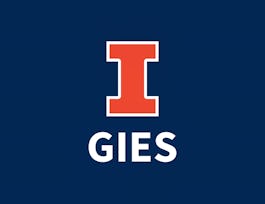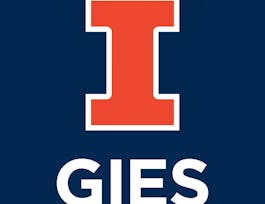This course builds upon what you learned in Financial Accounting: Foundations and Financial Accounting: Advanced Topics and introduces you to formal foundations of financial accounting. The main purpose of the course is to familiarize you with technical terms in financial accounting, such as debit, credit and T-account. While knowledge on technical aspects of financial accounting is not necessary to understand and interpret financial statements, this knowledge is critical to be able to understand advanced topics in accounting. Formal Financial Accounting is a prerequisite course for the University of Illinois' iMSA program and the terminology we will cover will be used throughout the courses in iMSA program.


Formal Financial Accounting
Taught in English
Some content may not be translated
14,279 already enrolled
(364 reviews)
Details to know

Add to your LinkedIn profile
14 quizzes
See how employees at top companies are mastering in-demand skills


Earn a career certificate
Add this credential to your LinkedIn profile, resume, or CV
Share it on social media and in your performance review

There are 5 modules in this course
In this module, you will become familiar with the course, your instructor, your classmates, and your learning environment. This orientation will also help you obtain the technical skills required to navigate and be successful in this course.
What's included
2 videos5 readings1 quiz1 discussion prompt
Accounting is the language of business. Managers communicate results of operations within a firm through accounting to various financial information users including investors and creditors. The main purpose of this module is to familiarize you with technical terms in financial accounting such as debit, credit, and T-account.
What's included
4 videos1 reading4 quizzes
One of the major components of a balance sheet is assets. Accounts receivables, inventories, and plant, property, and equipment constitute a major part of the assets. Understanding accounting for these accounts will help you uncover how these accounts change over time, their valuation, and their usefulness in managerial decision making.
What's included
4 videos2 readings4 quizzes
The major sources of financing for many firms are liabilities and equity. Firms routinely finance their operations through various liabilities including accounts payables, bank loans, and bonds. They also raise funds from their investors through IPOs and SEOs. Finally, retained earnings (earnings earned but not distributed to investors) constitute a significant source of financing. Accounting for liabilities and shareholders’ equity will help you understand how formal financial accounting for liabilities and shareholders’ equity accounts are conducted.
What's included
4 videos1 reading4 quizzes
The accounting cycle starts with financial transactions, and continues with journalizing these transactions and posting the journal entries on the ledger. At the end of the year, the trial balance is prepared. The final step is to prepare financial statements from trial balance numbers. This module will go over a comprehensive exercise, which will track the accounting cycle of a firm from its establishment until its fiscal year-end financial statements.
What's included
2 videos2 readings1 quiz
Instructor

Recommended if you're interested in Business Essentials

University of Illinois at Urbana-Champaign

University of Illinois at Urbana-Champaign

University of Illinois at Urbana-Champaign

University of Illinois at Urbana-Champaign
Why people choose Coursera for their career




Learner reviews
Showing 3 of 364
364 reviews
- 5 stars
81.91%
- 4 stars
14.24%
- 3 stars
1.91%
- 2 stars
1.36%
- 1 star
0.54%
New to Business Essentials? Start here.

Open new doors with Coursera Plus
Unlimited access to 7,000+ world-class courses, hands-on projects, and job-ready certificate programs - all included in your subscription
Advance your career with an online degree
Earn a degree from world-class universities - 100% online
Join over 3,400 global companies that choose Coursera for Business
Upskill your employees to excel in the digital economy
Frequently asked questions
Access to lectures and assignments depends on your type of enrollment. If you take a course in audit mode, you will be able to see most course materials for free. To access graded assignments and to earn a Certificate, you will need to purchase the Certificate experience, during or after your audit. If you don't see the audit option:
The course may not offer an audit option. You can try a Free Trial instead, or apply for Financial Aid.
The course may offer 'Full Course, No Certificate' instead. This option lets you see all course materials, submit required assessments, and get a final grade. This also means that you will not be able to purchase a Certificate experience.
When you enroll in the course, you get access to all of the courses in the Specialization, and you earn a certificate when you complete the work. Your electronic Certificate will be added to your Accomplishments page - from there, you can print your Certificate or add it to your LinkedIn profile. If you only want to read and view the course content, you can audit the course for free.
If you subscribed, you get a 7-day free trial during which you can cancel at no penalty. After that, we don’t give refunds, but you can cancel your subscription at any time. See our full refund policy.


